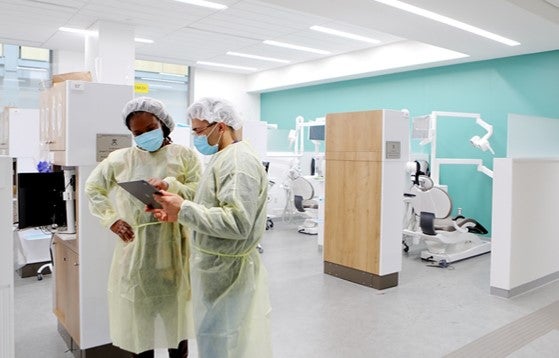There are many as well as serious challenges related to Down syndrome.
Apart from cleft palate or lip, Down syndrome (sometimes called Down’s syndrome) is the “most frequent congenital disorder encountered in the oral-dental field,” Dr. Atsuo Amano and colleagues write. It is commonly characterized by “a relative underdevelopment of the middle third of the face.” This underdevelopment can pose multiple problems for dental development and oral health.

In addition, people with Down syndrome often also have visual and hearing impairments and intellectual disabilities. Finding a dentist who can treat these patients with expertise and compassion can be difficult and frustrating.
At Penn Dental Medicine (PDM), we understand the unique needs of patients with Down syndrome. PDM works with patients and caregivers to meet challenges and offer dental care for patients with Down syndrome.
Understand the Relationship of Down Syndrome and Oral Health
According to the National Down Syndrome Society (NDSS), dental management for patients with the condition entails paying special attention to:
- Delayed tooth eruption
Both primary (“baby”) and permanent teeth often erupt (move from their nonfunctional to functional positions) later for patients with Down syndrome than patients without it.
The first tooth may not come in until as late as 24 months. All primary teeth may not be in place until age four or five. The permanent front teeth and six-year-old molars may not erupt until age eight or nine. And some children with Down syndrome retain primary teeth until age 14 or 15.
The precise causes of delayed eruption are unknown. The poor peripheral circulation associated with Down syndrome may play a role.
- Smaller teeth and shorter roots
When the permanent teeth of people with Down syndrome do come in, they are often disproportionately smaller than teeth in the general population, a condition called microdontia. The reduced size of the crowns (the visible portion above the gum) is associated with reduced enamel and dentin (the tooth’s first two layers of hard tissue). Less enamel and dentin mean more risk of tooth decay.
In addition to being smaller than average, patients with Down syndrome have teeth that frequently have shorter roots (the portion below the gum, holding teeth in the jaw bone). Short roots can result in problematic movement of teeth and tooth loss.

- Missing teeth
In individuals with Down syndrome, teeth are frequently missing altogether, a condition called dental agenesis. Congenitally missing teeth can cause other teeth to shift, and can make biting and chewing uncomfortable and painful.
Missing teeth can also reduce jaw bone density. The bone grows weaker because the area where the teeth should be isn’t being stimulated through normal use.
- Bite problems
People with Down syndrome also tend to have bite problems because their upper jaw bone (maxilla) is often smaller. Consequently, their permanent teeth are crowded as they come in. The result can be an open bite: When the mouth is fully closed, the top and bottom teeth don’t touch. Other malocclusions, or “bad bites,” are also prevalent among these patients.
Sometimes, orthodontics can resolve malocclusions. But orthodontic appliances can present their own challenges, especially for children with Down syndrome whose speech is slow to develop. They tend to experience more difficulty adapting their speech to the appliances than other children do.
- Large tongues
The tongues of people with Down syndrome are often too large for their mouths. This condition is known as macroglossia (though in children and adolescents, macroglossia can be relative rather than absolute). Their tongues may also have grooves and fissures.
Macroglossia can interfere with eating, speaking, and breathing. It can also lead to misaligned or protruding teeth, which in turn cause bite problems.
- Gum disease
Especially after childhood, people with Down syndrome are at increased risk of periodontal disease (gum disease). The risk is higher even when teeth don’t have excessive plaque and tartar (calculus).
This high occurrence of gum disease may be due to immune system abnormalities associated with Down syndrome, the combination of “bad bites” and deficient saliva, or challenges to maintaining good oral hygiene.
- Tooth decay
Some older research suggested individuals with Down syndrome were at lower risk of cavities (dental caries) than other patients. However, those studies evaluated people in institutions with highly restricted diets, meaning they did not present accurate comparisons.
People with Down syndrome can and do get cavities. Good dental management for patients with Down syndrome shares the same foundation as dental management for everyone: regular brushing and flossing, and limiting sugar and refined carbohydrates in the diet.
Penn Dental Medicine Removes Obstacles to Better Oral Health
Penn Dental Medicine provides effective, high quality dental care for patients of all ages including patients with Down syndrome.
We treat children under 14 years old in PDM’s Pediatric Care Center. For those 14 and older, we provide treatment in our Care Center for Persons with Disabilities.
PDM designed this state-of-the-art, innovative facility to remove barriers adults with disabilities and their caregivers often encounter when trying to access dental care.
Accommodations in the Center’s Personalized Care Suite include:
- Spacious elevators and hallways, wide enough for two wheelchairs, so patients can easily move or be moved about the facility.
- Partitions in the six-chair open bay as well as six closed operatories with adjustable lighting and blackout shades, to ensure patients receive the level of privacy they want or need.
- Wheelchair lifts and hydraulic-operated hover chairs to facilitate care for patients who can’t or prefer not to leave wheelchairs.
- A designated, carpeted, low-lit “quiet room” for patients who need or want protection against sensory overstimulation.
- Dental chairs equipped with digital radiology and nitrous oxide delivery capabilities, both of which help patients better tolerate and remain conscious and calm for treatment.
Get more information about how PDM is caring for people with Down syndrome and other disabilities and disorders. Download our free eBook, Overcoming Oral Health Barriers for People with Disabilities, today.
You can also make your appointment online, or call us at 215-898-8180.

